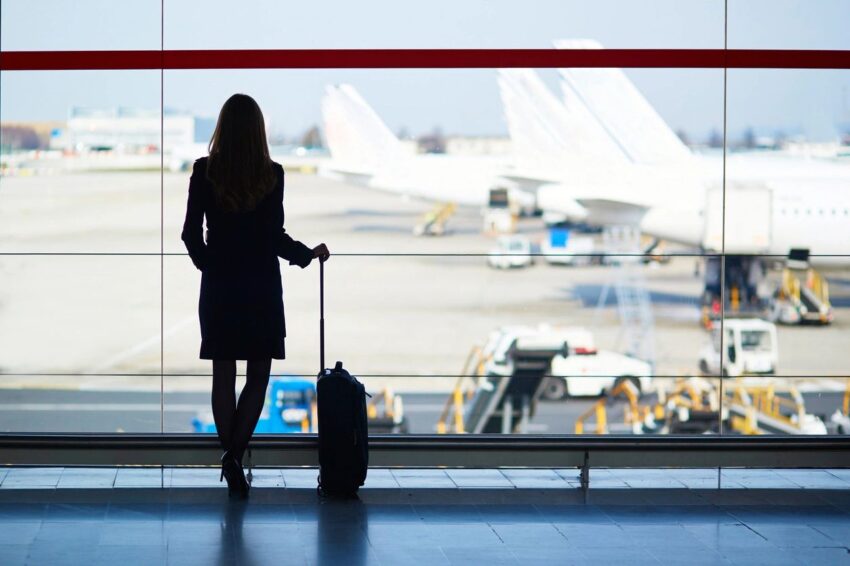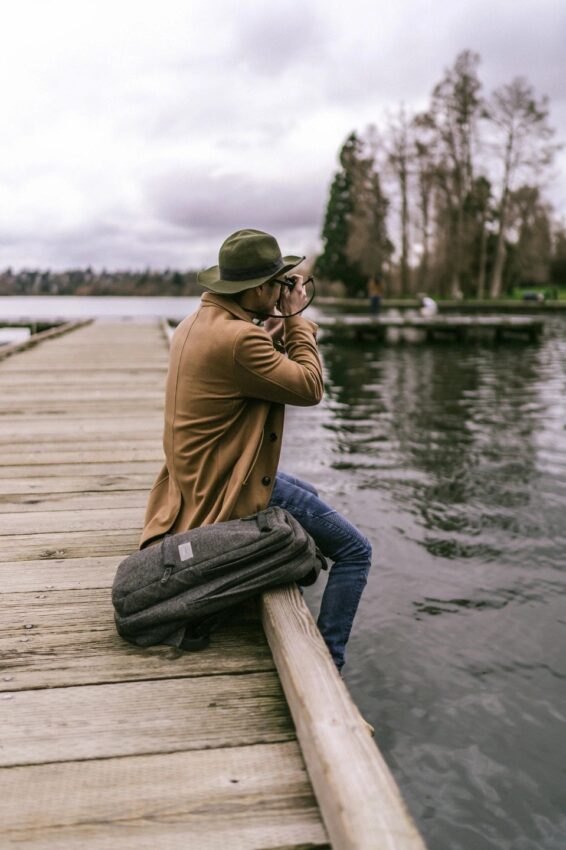Many people never travel alone, but those who do say it’s amazing and they experience things in a whole new way. You can indulge yourself, meet new people and devote your attention to the sights around you.

But traveling solo comes with its dangers, so it’s important to stay safe. But don’t worry—being safe doesn’t have to take the “fun” out of your trip. And being safe doesn’t always mean carrying weapons with you like pepper spray or other safety tools, though they can be helpful if they are legal where you’re traveling to. It’s also about preventing problems and being aware of what’s going on around you and managing issues if they arise.
Read on to learn simple tips on how to be safe when traveling alone.
Is It Safe to Travel Alone?
Traveling alone can be as safe as traveling with someone if you stay smart and aware. There are certain risks all travelers take, and to have the best trip possible, it takes planning and making the right choices along the way.
Safety Tips for Traveling Alone
Plan Your Trip Well
A large part of traveling safely involves planning. Many problems can affect you while traveling, including:
- Health problems
- Dangerous people
- Loss or theft of money and critical documents
- Misinformation can lead you to unsafe places
Research the Location You’re Traveling to Beforehand
You need to learn the basics about the places you visit. How far is your hotel from the airport and how will you get there? Research how to get to your hotel from the airport so you know where you’re going.
Also, choose the right hotel. It’s best to schedule your trip so you arrive at your vacation destination during the day. However, if you can’t, make sure you’re staying at a hotel that has a 24-hour front desk. Some don’t, and that leaves you without a place to stay, which is dangerous.
Register with the Government Before You Leave
You don’t have to do this for every trip, but if you’re going away for longer than a week and out of the country, register as a citizen traveling abroad. Registering this way means that the U.S. government can help you if there’s an emergency, which can be very helpful.
Plan Every Aspect of Your Trip That You Can Before You Go
Plan as much of your trip as you can, including the activities you plan to do. It helps to know what you want to do while vacationing, and learning where the things you want to do are located is a start. Do you need certain documents? Can you pay before you go so you don’t need to carry as much money with you?
You want to learn everything you can before you arrive so you know what to expect and where you’re going.

Trust Your Gut Instincts
Probably the best piece of advice to remember is to trust your instincts. If your senses are telling you something isn’t right, listen to them. Leave if things don’t feel right.
It’s easy to question those instincts or shrug them off when you’re in a new place with new people, but listen to your gut. It’s rare that it isn’t right.
Leave a Copy of Your Travel Itinerary with a Friend or Family Member
Make sure to leave a copy of your itinerary with a friend or family member so people know where to look for you if something happens. Hopefully, it never does, but you can never be too careful.
Be Aware with Situational Awareness
Situational awareness essentially means being aware of your surroundings and recognizing dangerous situations and potential threats. When you travel alone, you’re taking responsibility for your own safety.
Always be aware of what’s going on around you and be able to identify suspicious activity. Knowing what’s going on around you helps you avoid risks and keeps you safer.
Always Carry a Light
The odds are that you’ll be out at night at some point during your solo adventure, so always try to stay in well-lit areas. But just in case you end up somewhere dark, carry a flashlight like a reliable tactical penlight.
And it’s not only for seeing in the dark. You can use it to blind an assailant and get away to safety, too. You should always carry at least one tactical flashlight on you.
Be Careful with Your Documents and Money
Keep your documents like your passport and plane tickets safe. Many solo travelers find it best to keep their passports on them. It’s smart to keep copies somewhere else, like in your bag.
The same goes for your money. Keep an extra credit card and money in a couple of different places. That way, if someone steals from you, you’ll always have backup money so you won’t be stranded without anything.
Keep Your Valuables Close
Your valuables may be different from someone else’s, but usually, it’s your cell phone, wallet and passport. Don’t keep your wallet in your back pocket or dangle your purse so it’s easier for someone to steal. Everything can’t be considered valuable because too many items are hard to keep up with. Choose the major items and keep them close to you. There are concealable wallets you can wear to hide your money to prevent theft.
Always Keep a Map with You
Carry a map on you in case you get lost, but don’t wander around on the street with it. It makes you look like a tourist and takes your attention away from what’s going on around you. If you need to use it, step inside a shop or ask for help. When you don’t speak the native language, a map is invaluable because you can point out your destination.
Should You Take a Weapon on Your Solo Trip?
The answer to this question depends on where you’re traveling. Many weapons are outlawed when traveling to other countries, and all U.S. states have different weapons’ laws, so carrying certain self-defense items may be off-limits. Research the country, state and local laws where you’re going before carrying any weapons.
These are just a few tips on how to stay safe as a solo traveler. Plan your trip and always be aware of what’s going on around you. If you follow these basic tips, you’ll enjoy your solo experience and possibly have the best vacation ever.


